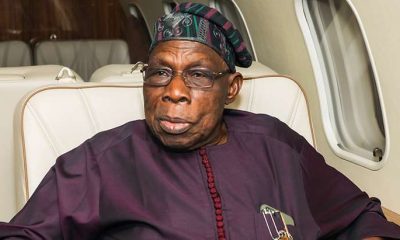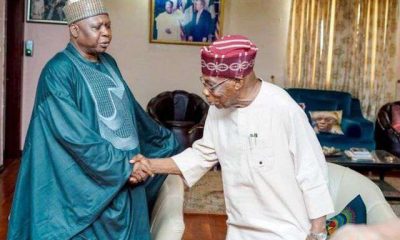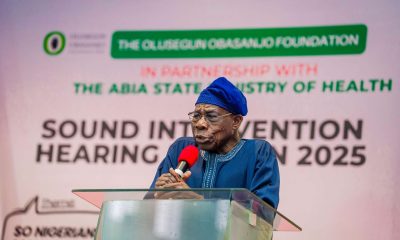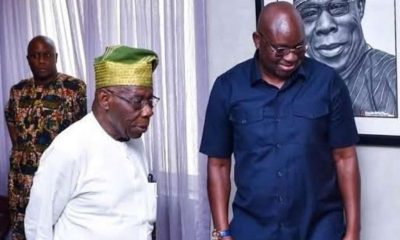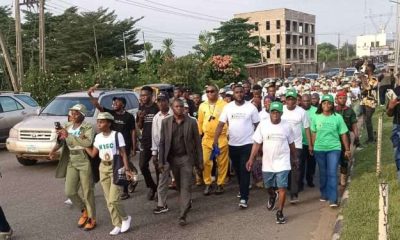Politics
Obasanjo, Anyaoku, Falana, Attah clash over Nigeria’s 1999 Constitution

A national conversation on Nigeria’s democratic future took centre stage on Wednesday in Abuja, as former President Olusegun Obasanjo, former Commonwealth Secretary-General Chief Emeka Anyaoku, human rights lawyer Femi Falana (SAN), and former Akwa Ibom State Governor, Obong Victor Attah, engaged in a spirited debate over the continued relevance of the 1999 Constitution.
The dialogue unfolded during the opening of the three-day National Summit on the Future of Nigeria’s Constitutional Democracy, convened by The Patriots, a group of elder statesmen, in partnership with the Nigeria Political Summit Group (NPSG). The summit brought together prominent political actors, civil society leaders, traditional rulers, lawyers, and scholars to interrogate the country’s constitutional architecture, 25 years into the Fourth Republic.
At the heart of the discourse was a long-standing question: Is Nigeria’s democratic dysfunction a result of flawed constitutional design or the failure of political leadership to uphold democratic ideals?
Obasanjo: No constitution can work without responsible leadership
Speaking through the Secretary-General of The Patriots, Olawale Okunniyi, former President Olusegun Obasanjo maintained that while constitutional reforms may be necessary, the root of Nigeria’s governance crisis lies with its political leaders, not the constitution itself.
“From my experience, I will be the first to admit that the 1999 Constitution is not perfect and requires amendment,” Obasanjo said. “However, the greatest challenge is the character and behaviour of those who operate it.”
He noted that even the best constitution would fail under the weight of selfishness, corruption, and impunity. “In the past 15 years, Nigeria’s constitutional provisions have been routinely disregarded or distorted by people in power, who sacrifice national interest for personal gain,” he stated.
Obasanjo, who oversaw Nigeria’s return to democracy in 1999 and governed under the current constitution until 2007, emphasised that no legal framework could redeem a country without ethical, accountable leadership.
“At this critical moment, we must refocus our attention. It is not only about the document itself—it is about those who implement it.”
Falana: Revolution, not reform, is Nigeria’s only hope
Taking a radically different position, renowned human rights lawyer, Femi Falana (SAN), dismissed constitutional amendments as insufficient, describing them as cosmetic and elite-driven.
“Nigerians have been deceived for too long. The 1999 Constitution is a military decree fraudulently dressed as a democratic charter,” Falana said. “It is not a people’s constitution. The only way to replace it is through a peaceful revolution.”
Falana condemned the National Assembly’s constitutional amendment process, calling it a “ritual” designed to placate public outcry rather than deliver real change. “Public hearings are often inaccessible to ordinary citizens. The process lacks transparency and is disconnected from the suffering of the people,” he noted.
He also accused the judiciary of enabling anti-democratic practices, citing Supreme Court decisions that have rendered electronic voting innovations like BVAS (Bimodal Voter Accreditation System) and smart card readers ineffective.
“The political class resists any reform that threatens their control,” Falana asserted. “It is only when Nigerians rise in collective action that a truly people-oriented constitution will emerge.”
Attah: Nigeria must dismantle military-imposed unitary system
Obong Victor Attah, a vocal advocate for restructuring, described the 1999 Constitution as an illegitimate document that entrenched centralised power in defiance of Nigeria’s federal origins.
“This constitution is not a social contract between the people and their government. It is a relic of military authoritarianism, foisted on us without debate or ratification,” he said.
Attah argued that the current presidential system concentrates too much power in the centre, weakening subnational governments and breeding inefficiency and alienation. “It has eroded the principle of true federalism. Our states are mere administrative appendages of the central government, lacking autonomy and creativity,” he added.
He called for a total constitutional overhaul to allow for regional control of resources, a unicameral legislature to cut costs, direct elections for ministers, and enforceable mechanisms to recall non-performing legislators and executives.
“Sovereignty belongs to the people. If democracy is to survive, then Nigerians must reclaim the power to determine how they are governed,” Attah stressed.
Anyaoku: Nigeria needs a new constitution crafted by the people
Delivering the summit’s keynote address, Chief Emeka Anyaoku made a strong case for replacing the 1999 Constitution with a new, people-driven charter that reflects Nigeria’s diversity and aspirations.
“Nigeria is a pluralistic society. No country with such complex ethnic, religious, and linguistic diversity can succeed under a centralised, imposed constitutional order,” Anyaoku said.
He criticised the 1999 Constitution for promoting bloated governance structures and unsustainable public spending. “We are running a government that devotes more resources to maintaining bureaucracy than delivering public goods,” he observed.
Anyaoku advocated a return to a negotiated federal structure that enables regions to control their affairs while contributing meaningfully to national unity.
“This summit is an opportunity to chart a new direction—to birth a constitution that is democratic, inclusive, and legitimate,” he said.
PANDEF, Afenifere, Ohanaeze back constitutional overhaul
The summit also witnessed strong support for constitutional reform from regional groups, including the Pan Niger Delta Forum (PANDEF), Afenifere, and Ohanaeze Ndigbo.
Ambassador Godknows Igali, speaking on behalf of PANDEF, called for the immediate convocation of a constituent assembly made up of elected representatives from Nigeria’s six geopolitical zones.
“The Niger Delta and other marginalised regions have borne the brunt of this skewed federation,” Igali said. “We demand a constitution that guarantees resource control, fiscal federalism, and equitable development.”
Afenifere and Ohanaeze echoed these sentiments, warning that continued governance under the 1999 Constitution could push Nigeria closer to disintegration.
Consensus grows for people-led restructuring
Despite differences in emphasis, a broad consensus emerged at the summit: that Nigeria must embark on urgent political restructuring to preserve its democracy.
Participants called for the setting up of a non-partisan National Constitutional Conference, backed by an Act of Parliament, to draft a new federal constitution subject to a national referendum.
The summit continues through Friday, with more sessions expected to focus on electoral reforms, judiciary independence, and pathways to national cohesion.
As calls grow louder for a new legal foundation for Nigeria, the nation stands at a critical juncture—torn between the comfort of the familiar and the urgency of transformative change.


